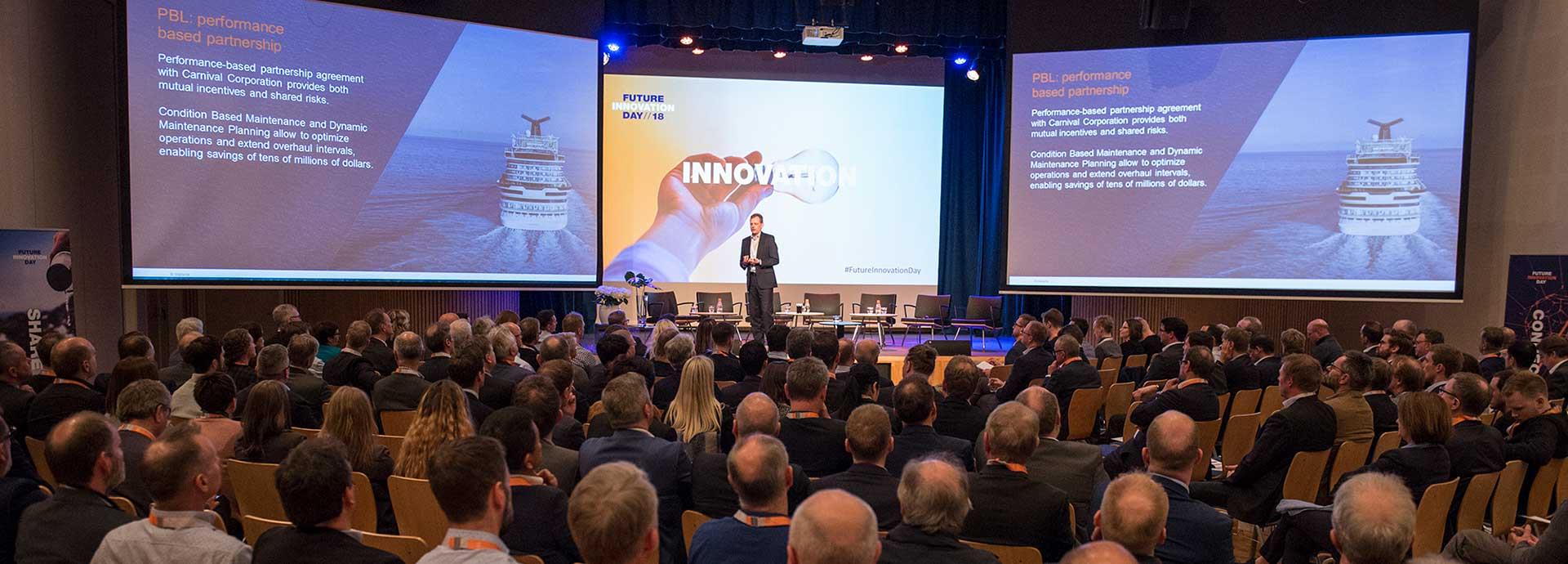

Around 200 customers, partners, government representatives, students and even competitors joined Wärtsilä employees on the Norwegian island of Stord, to discuss the transition to a greener maritime industry in an open, honest way. We bring you highlights of the Wärtsilä Future Innovation Day event.
On the day Norway made a historical decision that only zero emission ferries will be allowed on its fjords from 2026, industry leaders gathered in Norway for the Wärtsilä Future Innovation Day.
“The shipping industry is changing rapidly and we are witnessing major alterations affecting environment, climate, demography, industry and governance,” says Cato Esperø, Sales Director, Wärtsilä in Norway.
As Esperø explains, the aim of the day was to discuss the ideas, tools, models and technologies that will create a smart marine ecosystem and a sustainable future for the shipping industry.
“There are so many people involved in creating such a future - power companies, terminals, port authorities, students, government representatives, and competitors – many of who we don't talk to everyday. By bringing everyone together, we can begin the conversations that have to happen if we are to achieve our goal of enabling sustainable societies using smart technologies,” he says.
New perspectives help generate ideas
Harald Torbjørn Klepsvik, owner of family business North Sea Shipping, said the concept of the day was very interesting, especially “discussing the future with inputs from different parties that you don’t speak to regularly. It helps see things from new perspectives and generate new ideas.”
One of those new perspectives was from the finance industry, which will be a key player if the new technologies, solutions and applications discussed during the day are to be realised.

Cato Esperø, Sales Director, Wärtsilä in Norway, says that the shipping industry is changing rapidly.
Climate risk to drive future funding
Thina Margrethe Saltvedt, Senior Advisor in Sustainable Finance and Nordic banking giant Nordea spoke about how the banking industry can support the journey from fossil fuels to zero emission shipping. In one of the day’s most popular presentations, Saltvedt outlined the changes within the financial industry around sustainability.
“There have been sustainability funds for ten years but in the rest of the banking sector, things are also starting to change. Since 2008, we have been much better at pricing risk correctly. For example, we’re now starting to price climate risk, as we think it will have a big impact on the income and yield of companies going forward.”
Role of the Government
Esperø says that government representatives and other politicians were invited because the marine industry is very important for the country’s economy. “It has decades of tradition, including merchant, gas, offshore vessels, drilling rigs, platforms, fishing vessels, and ferries. This leads to a big industry and many associated businesses around it, so there is a strong cluster of interest for the government.”
Atle Hamar, the State Secretary at the Ministry of Climate and Environment, gave a speech on the future greener maritime industry, and joined a panel discussion on how to create sustainable business in the marine industry. But he wasn’t the only politician present.

Thina Margrethe Saltvedt, Senior Advisor in Sustainable Finance and Nordic banking giant Nordea.
Norway can lead the shift
Liv Kari Eskeland is a current Member of the Norwegian Parliament who sits on the Environment and Energy Committee. She is the former Mayor of Stord where the conference took place, and chose to attend the conference because she sees this part of Norway as well-placed to take the lead in a shift to a greener maritime industry.
“Norway is a small country so this is the best way to make innovation happen. I am very proud of this industry on the west coast of Norway, and it’s my aim in Parliament to take this industry forward,” she says.
Eskeland also says she’s pleased to see such an open innovation approach being embraced by all. “I think it’s wonderful that Wärtsilä is open-minded enough to invite others to participate in such a day. We are heading towards a greener industry much faster than I thought was possible only a few years ago. These ambitions on display here and a more open way of working makes innovation happen much faster.”
To highlight this rapid pace of innovation, Wärtsilä announced during the event the world’s first successful auto docking installation and test on an 83-metre long ferry owned by leading Norwegian operator Norled.
Structured thinking about the future
The Future Innovation Day concluded with a series of specialist workshops led by Wärtsilä’s experts from across Europe. Small groups of people from Wärtsilä and elsewhere worked together to discuss problems and potential solutions.
“We want to introduce this way of working, so that everyone goes home with more insights into the ecosystem and future challenges than they did before,” explains Esperø.
“If, based on these discussions, some magic ideas come up that could turn into a real business idea, it would be fantastic. You never know what will happen, but sharing and connecting to jointly think about the future is the only way we are going to achieve our goals as an industry.”